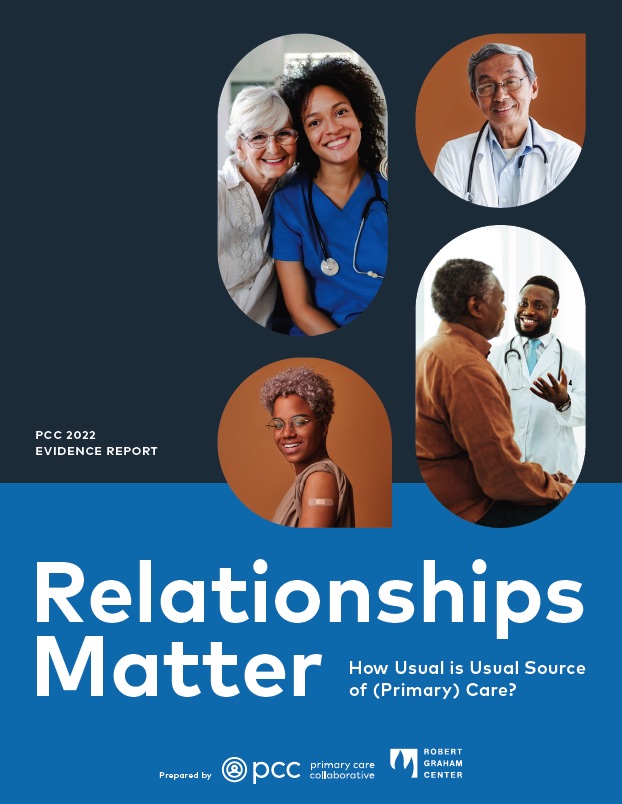The Evidence Behind Whole-Person Primary Care
On April 23, 2024, the Primary Care Collaborative (PCC) held a webinar about reimagining primary care to better integrate lifestyle medicine, behavioral health and non-pharmacological interventions. The webinar was part of PCC's initiative aimed at promoting whole-person primary care and lifestyle medicine. Click here to learn more.
Health care is abuzz about the importance of whole-person health.
But what exactly does “whole-person health” mean? What does the evidence show about how well it works? And how can primary care provide care adequately address the whole person?
Panelists summarized research on how interprofessional approaches to whole health—inclusive of physical, behavioral, spiritual and socioeconomic well-being—impacts outcomes, costs, and the experiences of patients and their care teams.
PCC President and CEO Ann Greiner also introduced a new Whole-Person Care and Lifestyle Medicine initiative launched by PCC late last month.
PCC's initiative on whole-person care and lifestyle medicine is funded by:
Resources
- National Academies of Sciences, Engineering, and Medicine. 2023. Achieving whole health: A new approach for veterans and the nation. Washington, DC: The National Academies Press. (See especially Chapter 3: “Evidence Supporting Whole Health’s Foundational Elements”)
- A Family Physician’s Introduction to Lifestyle Medicine. Supplement to The Journal of Family Practice. (2022)
- Jonas, W. B., & Mehta, D. H. 2023. Integrative care interest and offerings grow. NEJM Catalyst Innovations in Care Delivery, 4(9). https://doi.org/10.1056/cat.23.0237
- “Person-Centered Care: Why Taking Individuals’ Care Preferences into Account Matters”, Report by Community Catalyst, the Scan Foundation, and LTSS Center @UMass Boston (2022).
Studies compiled by Dr. Beth Frates on the evidence behind lifestyle medicine:
- Ornish D, Scherwitz LW, Billings JH, et al. Intensive Lifestyle Changes for Reversal of Coronary Heart Disease. JAMA. 1998;280(23):2001–2007. https://doi.org/10.1001/jama.280.23.2001
- Look AHEAD Research Group, Wing RR, Bolin P, et al. Cardiovascular effects of intensive lifestyle intervention in type 2 diabetes [published correction appears in New England Journal of Medicine. 2014 May 8;370(19):1866]. New England Journal of Medicine. 2013;369(2):145-154. https://doi.org/10.1056/NEJMoa1212914.
- Morton D, Rankin P, Kent L, Dysinger W. The Complete Health Improvement Program (CHIP): History, Evaluation, and Outcomes. American Journal of Lifestyle Medicine. 2014 Apr 22;10(1):64-73. https://doi.org/10.1177/1559827614531391. PMID: 30202259; PMCID: PMC6124862.
- Morris MC, Tangney CC, Wang Y, et al. MIND diet slows cognitive decline with aging. Alzheimer’s & Dementia. 2015;11(9):1015-1022. https://doi.org/10.1016/j.jalz.2015.04.011
- Wright, N., Wilson, L., Smith, M. et al. The BROAD study: A randomized controlled trial using a whole food plant-based diet in the community for obesity, ischaemic heart disease or diabetes. Nutrition & Diabetes. 7, e256 (2017). https://doi.org/10.1038/nutd.2017.3
- Yoshioka, N., Ishigami, M., Watanabe, Y. et al. Effect of weight change and lifestyle modifications on the development or remission of nonalcoholic fatty liver disease: sex-specific analysis. Scientific Reports. 10, 481 (2020). https://doi.org/10.1038/s41598-019-57369-9
- Rehackova L, Taylor R, Lean M, et al. Delivering the Diabetes Remission Clinical Trial (DiRECT) in primary care: Experiences of healthcare professionals. Diabetic Mediicine. 2022;39(3):e14752. https://doi.org/10.1111/dme.14752
- Panigrahi G, Goodwin SM, Staffier KL, Karlsen M. Remission of Type 2 Diabetes After Treatment With a High-Fiber, Low-Fat, Plant-Predominant Diet Intervention: A Case Series. American Journal of Lifestyle Medicine. 2023;17(6). https://doi.org/10.1177/15598276231181574
- Oakes-Cornellissen A, Morton D, Rankin P, Renfrew M. Efficacy of a multimodal lifestyle intervention (The Lift Project) for improving the mental health of individuals with an affective mood disorder living in South Africa. Frontiers in Psychology. 2023;14:1127068. Published 2023 Jan 25. https://doi.org/10.3389/fpsyg.2023.1127068
- The Science Behind the DASH Eating Plan | NHLBI, NIH
President, American College of Lifestyle Medicine
Beth Frates, MD is a trained physiatrist and a health and wellness coach, with expertise in Lifestyle Medicine. She has received several teaching accolades from Harvard Extension School and Harvard Medical School, where she is an associate clinical professor. Dr. Frates is one of the first Fellows of the American College of Lifestyle Medicine and a pioneer in lifestyle medicine. In 2008, Dr. Frates created the first Lifestyle Medicine Interest Group at Harvard Medical School. In 2014, she developed and taught a college Lifestyle Medicine curriculum at the Harvard Extension School, and it is still one of the most well-received courses offered at the school. In 2017, Dr. Frates was selected to be one of four item writers for the American Board of Lifestyle Medicine’s inaugural exam for certification in this specialty. read more
Medical Director, Benson-Henry Institute for Mind Body Medicine at Massachusetts General Hospital
Darshan Mehta, MD, MPH, is an Assistant Professor in Medicine and Psychiatry at Harvard Medical School. He is the Medical Director of the Benson-Henry Institute for Mind Body Medicine at MGH, Director of the Office for Well-Being with the Center for Faculty Development at MGH, and the Medical and Education Director for the Osher Center at Brigham & Women’s Hospital and Harvard Medical School. In addition, he is the MGH site director for the Practice of Medicine curriculum required of all 1st-year Harvard Medical School students.
read more
Senior Associate Dean for Population Health Research, Rutgers Robert Wood Johnson Medical School
Dr. Shawna Hudson is a medical sociologist specializing in primary care research. She has published extensively on the role of primary care in long-term follow-up care for cancer survivors. Input from patients, clinicians and the community is at the heart of her work. Dr. Hudson has led and serves as a collaborator on multiple National Institutes of Health- and National Cancer Institute (NCI)-funded studies. read more
Interim Executive Director, Families Usa
Yael Lehmann, MSW currently serves as Interim Executive Director and Senior Director of Strategic Partnerships at Families USA, a leading national, non-partisan voice for health care consumers, dedicated to achieving high-quality, affordable health care and improved health for all.
Previously, she served as Executive Director: Mid-Atlantic Region, for The Common Market, a nonprofit that delivers "local food for the common good." In response to the COVID-19 pandemic, The Common Market provided more than 1 million free produce boxes sourced from local farms to food insecure families in New York City, Philadelphia, New Jersey, Baltimore, and Washington DC.
read more
What's New
March 19, 2024
- Page 1
- ››










